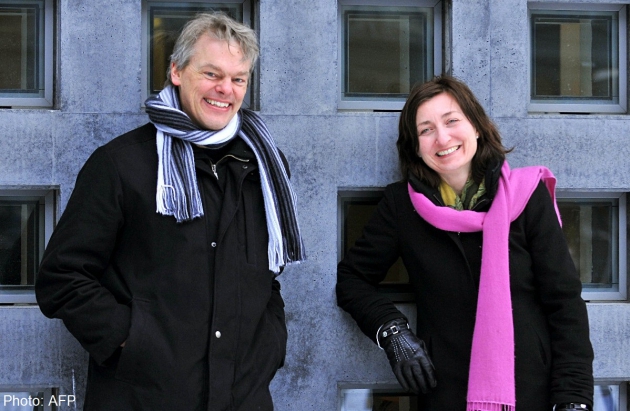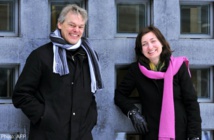"And to be able to discuss this when you get an idea on the spot -- instead of (having to) plan a meeting in one or two or three weeks, that makes a huge difference," she added.
The Mosers were the fifth couple to win a Nobel since the prize began in 1901, and the fourth to win one together.
French scientist Marie Curie and her husband Pierre were the first in 1903 when they won the physics prize, followed three decades later by their daughter Irene Joliot-Curie, who was the 1935 chemistry prize co-laureate with her husband Frederic Joliot.
The US-Czech couple Gerty and Carl Cori were joint winners of the medicine prize in 1947. Gerty Cori was also the first female medicine prize winner.
Swedish economist Gunnar Myrdal was a co-winner of the prize for economics in 1974, and eight years later his wife Alva Myrdal, a sociologist, was among the recipients of the peace prize.
Gustav Kaellstrand, senior curator at the Nobel Museum in Stockholm, told AFP that laureates tend to be good at "surrounding themselves with other smart and open people" and that he expected to see more couples in the future.
"Married couples are often a good team, they can bounce ideas back and forth inside and outside the laboratory," he said.
"And that's good because the best ideas don't necessarily come when you're sitting in the lab."
Nobel-winning couples do not only spur each other on, he added, some also have a knack for creating Nobel winning kids -- six winners were the children of laureates.
"Laureates know how to find a creative setting that fosters (research). And their children, who grow up in that creative setting... have natural access to the research world."
------------------------------------------------------------------------------------------------------------------------
The Mosers were the fifth couple to win a Nobel since the prize began in 1901, and the fourth to win one together.
French scientist Marie Curie and her husband Pierre were the first in 1903 when they won the physics prize, followed three decades later by their daughter Irene Joliot-Curie, who was the 1935 chemistry prize co-laureate with her husband Frederic Joliot.
The US-Czech couple Gerty and Carl Cori were joint winners of the medicine prize in 1947. Gerty Cori was also the first female medicine prize winner.
Swedish economist Gunnar Myrdal was a co-winner of the prize for economics in 1974, and eight years later his wife Alva Myrdal, a sociologist, was among the recipients of the peace prize.
Gustav Kaellstrand, senior curator at the Nobel Museum in Stockholm, told AFP that laureates tend to be good at "surrounding themselves with other smart and open people" and that he expected to see more couples in the future.
"Married couples are often a good team, they can bounce ideas back and forth inside and outside the laboratory," he said.
"And that's good because the best ideas don't necessarily come when you're sitting in the lab."
Nobel-winning couples do not only spur each other on, he added, some also have a knack for creating Nobel winning kids -- six winners were the children of laureates.
"Laureates know how to find a creative setting that fosters (research). And their children, who grow up in that creative setting... have natural access to the research world."
------------------------------------------------------------------------------------------------------------------------









 Home
Home Politics
Politics











